Wolfram Function Repository
Instant-use add-on functions for the Wolfram Language
Function Repository Resource:
Perform an in shuffle on a list
ResourceFunction["InShuffle"][list] performs an in shuffle on list. | |
ResourceFunction["InShuffle"][list,n] performs n in shuffles on list. |
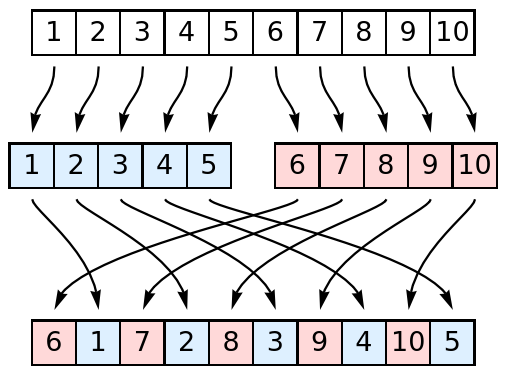
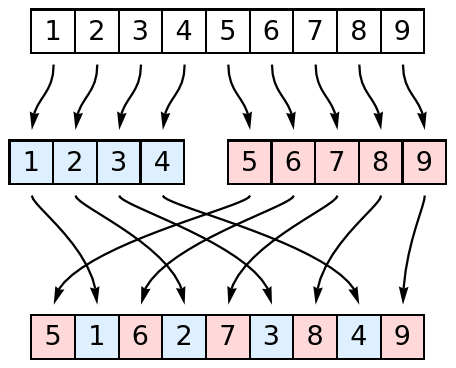
Perform an in shuffle on a list of 10 items:
| In[1]:= |
| Out[1]= |
Perform an in shuffle 3 times to a list:
| In[2]:= |
| Out[2]= |
Confirm that this is the same:
| In[3]:= |
| Out[3]= |
The list can contain expressions of different type:
| In[4]:= | ![ResourceFunction["InShuffle"][{2/3, 3 + 2 I, "Test", \!\(\*
GraphicsBox[{{{}, {},
TagBox[
{RGBColor[0.368417, 0.506779, 0.709798], AbsoluteThickness[1.6], Opacity[1.], LineBox[CompressedData["
1:eJwlmXk4lN/7x61ZEjPPjJAU7SsppYXuUwlFSokWIWkhSURIKpWQZK9kS4X4
RHZJTpSikKiEopAsYx7rmJksv/O9fn+d63Vd82zv9/u+73Ou0bA/u/e4mIiI
SJaoiMj/VnEsW9ux9upmXun/rwt7SjfNibSFu/mNw7PJKnyu5dAUcRbORecZ
fCHrH/YpfkHEZbjytMwnmazNhtfLn0TcAbWrSdX7yPrVNmJxfEQirNs+w2J/
eCLsdVZpvheRBWux8JX37SwIH7LOjYnAsF7xqYGaH4ZNFTtlt7rXwY2SV9tl
t9eBq4/Z0VzX71B44Y1OSVMjnCk6Hio2/xcsypjzyZjTCl+6d8ik2ndCZ1fT
wQrpDgjW4okUHOwGDal00Z3MLji3vDL69RMOCNzfr83gd0Pn8c4rSQUcOOdZ
NH+teA9YJok4X3nPgedXZqgVzeiBjYobtqIeDtTb6Sx6Oq8HxKaecvGKftja
M3OLrmkPRNTfMsK5/WB/MpktmtADOd67Ba/KuGDW1Oihq9cLwmOnM3+6DEDG
zO7au/Z9YMcc9irxHICSqcNzXzj1QUWpz7YHfgMQ4RBZ0+DWB2Eqwd8PhA5A
kYnnplH/Plj8KU3sy7MBWGcWvKg7uQ8sNnZZfuAMQPaxhbdCfvdBJuPoVIHT
IKjEWJwpP8gBdml3VbTbIKSUiVVNP8oB79OuUed9BsHkR7Oh2SkOGLy7vHR1
8CC4N4gnl3pyoOViwr5nTwfhTo7bE9NIDkj/bUl91D0IHw3k7WZ/5ID9K8s9
YSeGIGA/5vmt7YfVBcqUytkhcOPND3bX6wexrOaGhxeGwHveqmrbbf2QnGRj
lRs4BJoP7SzmmvdD+7UTNt/Sh0A3OXzzRmei005P59n0ELxe71vzM4lwY3Rg
2oVhYJze2F8rzoXVdVY7ta8Mw5HOxpx8GS6IVanIFQcOQ6BDISdSgQvJxfF3
Pt4fhp7D4QXrVLnQHv8khvtyGA7k3TqvuJoL9g75j3VERuDXG9dV62y4cGzw
y+vXgSPg6O/YJsjigp1PmFVR2Ai05sw+5pPHBWtxU27WvRHw1K3ZMVzEBUvF
N6qJaSMQGle0qZb4aLwh2/NS5Qi0Gc2PXNLABc2rt1dslB4FmYnPGi4jXFgm
u+ONNmMU1GKdLc7zubA4UuLQUuVReFu0tMltnAvqTy7eVF4yCrdB6esBCRpY
VY7tPKNR2Bzme7GSRQOfYXgv9+YorMuIy1yrTcPIfVGtjDuj0PYxN+y1Dg2D
815VJN8dBX9RYf629TT06ugMh6eOQlHd/XergYafB+aZub4fBdFg/e5cUxrK
kybFV0rxgMtRPr/lBA2lS4tjFyjwoMrjy4I9jjS8zPHQnq3Eg/6ygulWzjTk
veXYTF/MA1py0GuXGw2p3c0vegx5cG9+TsmPSzSErCo8mxLAg8NaZ02uR9Lw
YXVjl0coDwZ3JC+XiaFBeu3Yke0xPDDmiNwIuEfD9Q26pp1PyP1ZHUlO8TRc
3Fq4ZF4FD0avKJz5nkJDkUFj4mA1D/a2npim8ZQGnuHYzLIvPJghfYRtn0GD
m4mupF0nD5pviIbUZNHgZFH4O158DN7tjGjZUURDmmXjgTPTx2BlzMbplsU0
dB0Y+6THGoNSkVMZh0poOHpEt7Rl3hjUR5zctOs1DQdOFMaqbB0DB92RkMb3
NBh5Fe6LvjIGOnPFo658Je/r0/jBIXAMlp/aGMNqJPr5jm3RCRuDwkg1scTv
NGy+qruqIXEMnvu4Kia20LAuuFCOicfg9VJndYPfNJwPabz2690YPLmqciK2
nYac0DFhVu0YrIrOpXo6aFgZqdtj1joGnFLXxLNdNCyIK6wImRiDvHWVfhp9
NNgnNOpZS/LhWtPN4Y0cGpKSxnKXz+DDzIHuatN+GmY/0U3+MJsPOVtD/jtI
03Ao1UoldgEf1J3NcywGaLj39EKY4wo+bOx8pWo8SPKVWegnrceHptspysrD
NOx53jjauI0PA5p5GSOEQ3PGnFNN+DA8ceth1QgNsoW6hw0P86FWUJdnzaPB
+IVVveIxPkyf1fp51hgNAS8v7PjjRN5n9+iez4TFXhfqXvfhg/nX6POLBTSk
z6BSJvz5ECLxe88XwnsPO7Mv3OLDz7RGHS8hDcK0d/4DkXwIrzRRZ/2j4RFP
fdAxjg9aXCbrCWFTg4u2HY/5ELBEdIbmOMl/+Nca62d8yJcdnpFJ2GBlcPru
Uj5MpJkviJyggePTqVz1jg9mGn4b+ISjKjff3PqJD+MvVuy3mKRBb+b90ZeN
fLCK23YhlfCfY8PH1v7iwzrPjMRBwqHZu+ozu/kw5b27dvUU8XMqFS0Z5MMz
GzXx04RbTcWyHgr40GAruTmWcECstZqqmACe6Av9XhPW7C64FSUrgDG9wYqf
hL+tZQpnsASwbXE7NUTY79rpUzdVBZC+8/3xCcKLP1d8E1kggBHv+NIpwnVz
1Lf7rBBAtJyDmoCwl7NP7rCOADJaZ/v3EFYv/qJxRl8A43uqOXWEK6W0wrq2
C4Bn7H0ki7Dr/qBJWzMBZK1a+eU6YeVHHc5NlgJo4w3vMSf8ekC/Za8tYfkf
DWzCjpvv7ag+KYBHrjzrT+T7qZChwu2uAnhxz5JzhXBxk+ki7CWAzYGU/1LC
9otTo9ZfFcCPt1vnVBF9ZT1ExXOCBFB+QKzMlnBO+eFzyyMEkFDv4tRP/DnE
KGh7HCuAO9vTZrkRFrNhmM15JID5Oz5/7if+ZmQ4ldzNEICJQD7MjrCF4O0y
Zp4AdvEC938g+Rg3nHs/uEQArxwc5y0nbNre4HGpRgDnX1ENn/kkD1qanbyv
5Ptv6BUqEY67FLjXtVUAyDf0kQXJY7+yvtYxWgCXDwdG544Sf3endBszhbDy
ocsfySHib7yIVbmKEDLG7JkSpD5aew9VbJonhKM5F40EpJ60AhSSNdcIgdYx
bqgk9VZX4nWYvV8ItSaqbuPdxB/ZhqrbR4SgLk2P5fwl/hxYuV7qhBC09K8H
25F6dh3+zRZ6CkHc4lxjEql35jKT2rZ7QtgdZala8JP0J6lEZmWSEPrOuGmh
H0TvP0MWz9OEkBDpe7G8mQaHh7EtV4qEkBNeX5JF+k+Rcm+3xnchHD6qRa/4
TMNtnv4K2V9CYFgeqvH6RPz5En526K8QFsdEdJXU0DA9bAOvfEwI3KDWjys/
0GAjFSTuoPQPOOd0XXLKaVjz54eh6dx/4JlOab8m/VD6zapgncX/oDYhcvW7
UuKn33eGpO4/aBnxHC4m/VSSt3hOiuU/kBos9THKoeG/znfru6P/QZHwuGJ/
Ig1Xy2f51sX/g89+mSKXSX+3THLBRU/+QY3shjUyD2gQsZ5pGJT/D8pPXHKd
RubDvobj+5Z9/QcfB+SOPL5F+kGZhIszexySeOWhLh6k3yRufTQQMQ7vAuU2
bdlGw83Kup/+D8ahSNVjYRSZb+8GbZQVH5Pfb1+l3LqJhu0GF29vyB+HuVc7
ZlmR+bi1J/eCf+M4/LyenftzAan/NQtN2bMnICNoTHMzmber3kuN6j6ZgKsx
HTkWJVw4OxCt9eHZBKDnN3qCC7mQqbLAybpgAt5aXd9dlMOFlc6o7cr7CZCR
nZ/FTyPzneldVdUzAQW3t3cqRHNhweHe+MOak+CccdTx/mkuKNHVhpcLJ6Fc
st13PsWFe+H4aA+ehNCrxko2clxQ1snx3Vc5CS9Tl9qHTSPsfTdncdMknO6o
Uvgh7IdZ4vZz6oSTsFJLgq/Q0Q9zlMZG1TdPwWj78Nm+7H5YBBpPyt9OQYrX
GPPSjn6IfV8sKu4ogg6zfy10t+PAwK/n3rSzCLJ/HpemSfZ/RsKUwRZXEXQi
PfZghzkHRlZE/s7zEkEL1I7uWr+NA2YRp8tOBIogReekZ2ELOSB2ZPbVD6ki
qLg+oH28uw9OD10SiegSQb6NIiJ1ZH+qp7ZlSt1BFNXdDDxYc6gXjK2/uNmf
EkXf2950aZj3gsWDk12PnEXRIcEN0bNGvXBaJbRmkYcoavsX2zu0phdiFVse
rAgQRZ+Kjn9/KNcL/Bke69eniSLfUsOohJIeyJtMO7ebI4puRhgGLlbqgeW/
GJ2XzouhQ7rDnWqFf+FZGnUq300cyfGkPrm2dYJv65GG5QES6Ofe40uvufyG
c3rrTRKiJJFvnVHUGr8WECYa2PeFTUPNXaYPKzW/QJ1rrN2FZCmkJue9xO3L
e9hgNG/y50Np9Pmb3IlJkedQtX1DGoqTQRvqbOZkhWTiJ9n3N7RnyKLPLHW9
JxcqseL8FU42T6cji8U5Cwz/NOB6UWl/lRI5JPEh8alOcwvOl3ZPqauagaK8
V+W/ifmNVygynOwr5NGKsEcHrF92YjqUx17zTQGtus3sWFT1F3MG5pSvbFZA
holviqsa/uLevUZnl7QqoLf0vmcnWv/izpn3qtS6CI/f+R46/Bc3J2zwk+Yp
oI0RppN31bqxvVXpMFeWgdSX2W+95dqNd50UPfJ2GQNti3do7GD24Pk3b2qd
dWIg6SpL/4Ytvdjtm46fvTMDrSsQj325sxe/Xthevd+FgZa0njgXv68X27zV
c9JzY6DwllZLs+O9OFZ06LGMDwOd7vtc5hDYiylf61mPgxjIyyzM0L6mF4ud
05ZsSmMgx6PjdeF7+7D569Z91ekMtDJI8c+zQ304SSEkGf/HQL4xel5v7Pvw
5swuSHnOQD+yJdktbn3Yp++Bj3sRAwX9ZXFeRvThoePTBmZUMlDdp+ILWz/3
4fZDLc1b/zKQ9vYtsy13cLCcvlWqXQ8DJbxq+aRnzsFr5za4+/UxEFdeIUb1
IAcHdnyQK6YZaJalm3nZKQ7Wci7erM1nIKfCaUbPbnKw76X7yXNlmCjdLtJE
8i0HKyZZOY0vY6K90iEaqev68Wb/hnWzVjJRycl6+RD9fnzKYbf4ei0mMlwS
XH3KoB+XLDGKc1/DRHq9Sdkye/uxffa62t5NTPSmTru/27kfZ5Yrrm4yZSIN
9eSbqg/7sfGfBkG+CxN1zjfNNhDn4kvLQy9muTKRUUnU8EtpLs45ZzyR5sZE
l8LVO5fLc7HqZIlInCcTvW8r+DCqzMXcmSlS/n5MNBmmE6StycVRxl6KZqFM
VL9S+j8jKy7+lTFbu+sZE9UkKnD+POJixaFvOW1ZTLT6uWGgaxoX71wfrtOU
zUSp579mDP/HxblvJddX5zNR5p/o6x35XBzwk7s55xUTLWeY2Di+J0dZhTJT
vxomEuRWVcj1cLGX2/FTM/uZaF+yvW3GIhoHmnBPbqSZaEvVqmkRy2h8d8GF
kzaDTHSSI/b6rCaNC74FnkgZZaLgPqNTjHU0Ht74n8O6SSbqcB917jKgsYv4
sJ2lAoVCHE2tO+1ofOnHRTsfJoUWjc3M2+RA45B8CbsEFoUM/x6VDz5J44yT
M227lChE8bLfTXehcffHDUc81SnUb3JoxSMfGh+LunIwRptCDDmQ1IigsdsZ
mYPFayjUc1dRpTuKxv6GEQda11Jo/8RFjZS7NE7iP7JatJFCkbnf5KTiadxq
/X5/wVYKzQ9xXG+dSuP+tXv2NxtQKNF/b0vzUxqPyzdZTBpSaNPFj857/qOx
alnvPkMTCp39lnBAPZvGBxbK7/22j0Ka7gVoXzGNT03GmAv3Uyg4hG8QVELj
C41zzeccoNBSyXOrC0ppHBOkveeENYWWPw96N1JO44Z+CzOeA4UcZULKJT7S
2Kzgwc6ZnhTaqDp862wTud+w/ZSiF4W2yj3Yw2+m8bVVy/IUfSikN9qi7v2D
xkXpRWqKfhRyM01vt2+j8bzErwOsAAotfOL++1snjfV+xD1hBRK9xOv4c7to
bKXicIgVTCG7rePKR/8SvSOH3lChFHp5/4bbxx4a824q3GXGUIiFWf6IS2NG
xTcT5j1y/ab7jTtoGi8XSxBhxhI/ah6vMRmgsZ3vCidGAoUeq+yeXDtEY58X
w3MYSRTyMHR3njtM42hecYNCMmGnJb9ERmj8wXWHvkIKhRIcTjRmjNK48xlj
SD6NQhZx1w958Gg81duYIp9O9A21aV83RmOd4ycY8pkUmm0eMPWQT/RJXlkx
4zl5vod3lImAxo5tI94zcihkJHRb2U844eC1DrkCCp181eSk/I/oE7PznlwR
hYa3jMsnE25oYO6SK6YQO/9OwfxxGnMZTaJyJRRyKXA/Gk9Y2iypYHophdZ2
BikoTBA9b508Pf01hTa35L/2Iqxfqak+vZxC4ro/zzcTPiDJ+yL7lkKp4X+X
60yS/G19FST7jkIT10r/3CAccvn6ZtlKCkU82ZVM9ts4tcRkWOYDhf4L8T/K
nKJxuYBKk6mm0N5a0/kmhH+sa7aWqaXQnsn4v76Eee4PmTJ1FNqQ5ZiZQpiZ
feqddD2FzriRaUR4BVfrovQXCil9N97WTthw+ZiW9DcKrTm7izlC2O5UaafU
dwqFVWT+JucPfPHJjftSzRSqPemUR84fOKbd1EzqB8nD78tB5PyBn89li0u1
kvosGbDrI/zBuqVw2i/yPP/XG78S/nM/2XlaO8lD8cjMQsIijY4a0zopVMWJ
Gg0jPIut/U2yi1wfn/7NnrCOOT9YsptCt823FK8gvDsUg2Qvuf7WiSQu0cPp
Y8CIBIfoU7s0KI3wdWmzpxJcCi2OjTt/iHDCdkUbiQEKMV3q7SUIv/D/QUkM
Uehc5a99KUR/7riTrziPQqFifzfXE/8OHjBZKhij0Gl7kXgbwm9zl3/jCijU
WFGyq4P4f9+Jo9U8QSGR+pjUr0IaS7yr/vFpiuRnzeiebYRdNJ4FVYiykIaM
166nJE8G3890PJdkIZ/3V5ANyV/WGrOwFCkWslhoqfuM5HPWHU39OBkWsmvn
Xh0h+R3YTsfcnMFC01PVWM4k3w9yXXfaKBLOebVsapDG0xTMx/YpsdBBX+5b
BmFXJ+3HO1RYaOynV94sUk+GGkMTOmos9OxiYJQSqb+hUPfs6QtZyLPA1zaf
1OeR3n02ootZ6D3XMiOom8aV23Wmjy1hoYTiGDNLUs/x4yMO7SvI9cKzcd9J
/Rs7eSq/0GGhrBvyNldJf8itsKzIXMdC/Z23zyi30niOhq7b4/UsFOo18i2V
9JPhxrGPd/RYSH+ouSir6X/6e18+YcBChT0r3xxroLHMw4MrrA1ZqPujMOPV
ZxqfH9/QZG7MQldEUwYV6mi8I1e4Wt+UhUxq10bHV9N4RN23i2XBQrNseMZH
Kmhs62sdKWPJQnkeDgt83pB8NeqhKSui5x41uztlNE4Mnbjfe5iFdu02Fia/
ovHOcb9dZcdYaMmf7+9c8mn8sPFqnos7C8XMuqN9/xGNuypWtYV6sJAQFRRK
PyT1kNcmk3WBhWaAwe6zCWQehenb0hdZ6AYnIF/jPo2rdwhkXK+z0AabBnfV
UBrzX7ranosm9zfXdDzmSePN6XODw++ykFbNoWMG7qTf3qvNy75P/K1rvjjb
lcbyHitkh+JZyCvo1PQcRxrP1+zOc0thoUt9pqVu1qQ/JdnKni9kIba4qLEJ
onFUqPzaqBcs1GxWfzdBj8ZNvq9s816yUE3jccWe9TR2OKiaP4JZaCpzWsIx
bRp7U422HpUsFLBaXZzWoPHj62b5nk0s1MWxZduJ0lh4St/O+x8L1dcER+S+
IPP95TLkMcFCb7LTryIyzx/MUFY/N8VCzmckOyqec7FezlDbKXE2avD7KlKc
ysV+/1JtD0xnI84lzUqjaC4WD6VsdVXZ6FmWSYDQhYvlcv8eGd3IRmX/7V9Y
MZuLrSW/6g/qsdG26jnJ9kpc/MyqXK1/MxvVUPxCPpOLzcbjfnZuZaPYiFV5
8lJcHLZ975EvO9koNcGD3T7Qj9nfS6xzD7FRd+XCtMVv+rHaRPjhcz6E/8aq
rLcn+6P2XS/u+rJRe22ulsPhfnz+vYxSqR8bFQzUf7hp0Y8/hF+tl73GRvIN
rHv5hv3Yc9G5HY9vsdHPa0XvMpb147rde3Qb49joqoS5vsQgB/sny7P0MRs1
FynuP3+Bg7uMbn2QllBE1rb9az6d7sP2JnbqC6cpois7fLSVjvXhn2ZrPbdI
K6Jxwe9QK7Jf/bK/TcNHThF1aYm5lxn34fJja7z72IrojxJauHFhH46/3LK4
dqEiMh9xsSn70YstCpffiDRSRA/rDo+tN+zFbxZVw5xbiqjx2FsNe/Ee7CSd
IqEhMxN5bpfdWWPbhQuTFui/CZ+JpF6tdCrR6MC1m/Qq9jKVUIBbccWbu22Y
7/Rgn12oEtIqtCh+H/kdV+5J3D9jpjKaaP3+Xj20Dttv0EtNjVJGcZ7WaWpx
Zdixv2b0R4wyKpG001SzLMOuD20NqPvKqLrn42klRhm+LHPtt2+8MmJN22Q/
fu01jmuqUt2booyCz79dpNhYir95W4WNFyqjhu6ZntHuxXhnsZu3eYsyqndO
mPErJRubu0hUBvxURhu/N7a0qWTjA/NiZpa0KaP51766N4c8xyeDX+Qu6lRG
x/ypQ1f/ZOLrh0S4/zjK6L2P5kCGbzouFd62T5lURh5PoxdFPn2IKzLnZreI
qCCe01lT9p0kXG2fPcUQV0EtYXnV6j0JuOXDl7iLUiros9H9+FG/WMyPVW3c
w1BBv7clFm9LD8dTZs8WBlAqyGHRzk2M3lA8TRzOv2SroNXD9tF3Lgdj9ml7
5iIVFVT39e/JC+lXsercEdvDqipoAdU2r+KyD57XcCMzTE0FvUjxsI9MP4eX
3VSaqJirgtbHnblclH4Ua296avJPQwUt1L79v/+3Sv8Ph2LZdw==
"]]},
Annotation[#, "Charting`Private`Tag$15294#1"]& ]}, {}},
AspectRatio->0.6180339887498948,
Axes->{True, True},
AxesLabel->{None, None},
AxesOrigin->{0, 0},
DisplayFunction->Identity,
Frame->{{False, False}, {False, False}},
FrameLabel->{{None, None}, {None, None}},
FrameTicks->{{Automatic,
Charting`ScaledFrameTicks[{Identity, Identity}]}, {Automatic,
Charting`ScaledFrameTicks[{Identity, Identity}]}},
GridLines->{None, None},
GridLinesStyle->Directive[
GrayLevel[0.5, 0.4]],
ImagePadding->All,
Method->{"DefaultBoundaryStyle" -> Automatic, "DefaultGraphicsInteraction" -> {"Version" -> 1.2, "TrackMousePosition" -> {True, False}, "Effects" -> {"Highlight" -> {"ratio" -> 2}, "HighlightPoint" -> {"ratio" -> 2}, "Droplines" -> {"freeformCursorMode" -> True, "placement" -> {"x" -> "All", "y" -> "None"}}}}, "DefaultMeshStyle" -> AbsolutePointSize[6], "ScalingFunctions" -> None, "CoordinatesToolOptions" -> {"DisplayFunction" -> ({
(
Identity[#]& )[
Part[#, 1]],
(Identity[#]& )[
Part[#, 2]]}& ), "CopiedValueFunction" -> ({
(Identity[#]& )[
Part[#, 1]],
(Identity[#]& )[
Part[#, 2]]}& )}},
PlotRange->{{0, 6.283185307179586}, {-0.9999998592131705, 0.9999998782112116}},
PlotRangeClipping->True,
PlotRangePadding->{{
Scaled[0.02],
Scaled[0.02]}, {
Scaled[0.05],
Scaled[0.05]}},
Ticks->{Automatic, Automatic}]\), x^2, Entity["City", {"Enschede", "Overijssel", "Netherlands"}]}]](https://www.wolframcloud.com/obj/resourcesystem/images/751/751bc13f-28d7-49c4-8d86-53aa4baa3e18/4711c20bf2e2c038.png) |
| Out[4]= |  |
Create a sorted deck of cards:
| In[5]:= |
| Out[5]= |
Shuffle the deck once:
| In[6]:= |
| Out[6]= |
The original is obtained after 52 shuffles:
| In[7]:= |
| Out[7]= |
An in shuffle on a list of length 2 can be seen as swapping the elements or reversing the list:
| In[8]:= |
| Out[8]= |
Figure out after how many in shuffles a list of size n returns to its original order:
| In[9]:= |
For lists of even length, the number of shuffles to return to the original order is known analytically:
| In[10]:= |
| Out[10]= |
| In[11]:= |
| Out[11]= |
Visualize how the positions of items are changed for a list of length 21 in the form of a Graph:
| In[12]:= | ![t = Range[21];
edges = Thread[t -> Ordering[ResourceFunction["InShuffle"][t]]];
Graph[edges, VertexLabels -> "Name"]](https://www.wolframcloud.com/obj/resourcesystem/images/751/751bc13f-28d7-49c4-8d86-53aa4baa3e18/505d6fc8ead59f9e.png) |
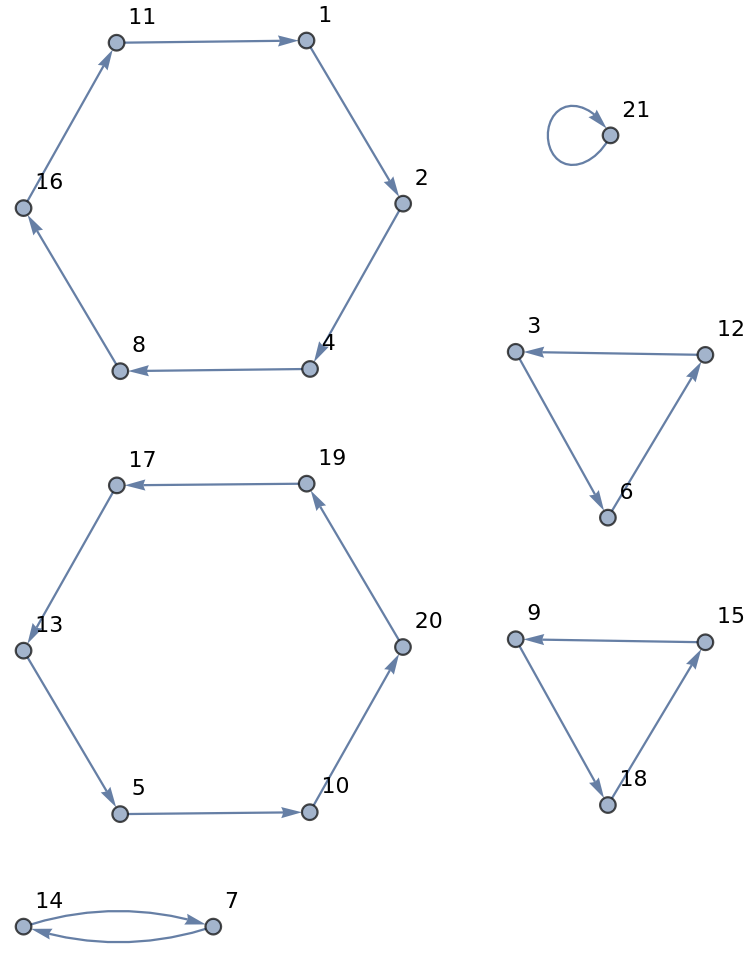
Confirm that 6 nested in shuffles returns the list of 21 items to the original order:
| In[13]:= | ![t = Range[21];
edges = Thread[t -> Ordering[ResourceFunction["InShuffle"][t, 6]]];
Graph[edges, VertexLabels -> "Name"]](https://www.wolframcloud.com/obj/resourcesystem/images/751/751bc13f-28d7-49c4-8d86-53aa4baa3e18/03c526d8d666529f.png) |
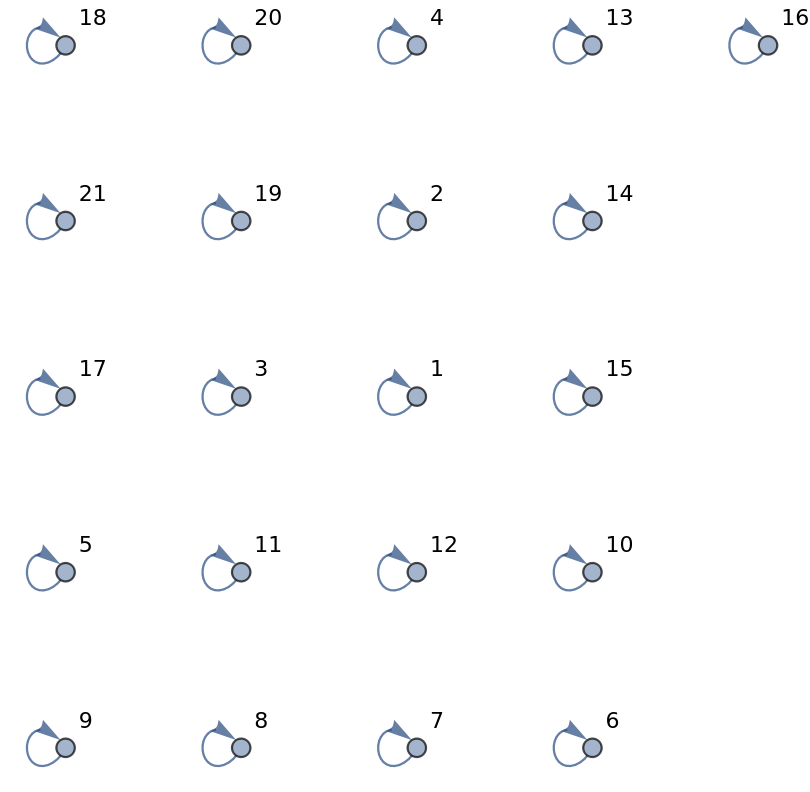
0 iterations returns the original list:
| In[14]:= |
| Out[14]= |
Plot how many in shuffles are needed to return to the original order for a list of length n:
| In[15]:= | ![howManyIterations[n_] := Length[NestWhileList[ResourceFunction["InShuffle"], ResourceFunction["InShuffle"]@Range[n], # =!= Range[n] &]]
data = Table[{i, howManyIterations[i]}, {i, 1024}];
ListPlot[data, Frame -> True, FrameLabel -> {"L", "Number of shuffles needed"}, PlotRange -> All]](https://www.wolframcloud.com/obj/resourcesystem/images/751/751bc13f-28d7-49c4-8d86-53aa4baa3e18/08505110d81e101c.png) |
| Out[17]= | 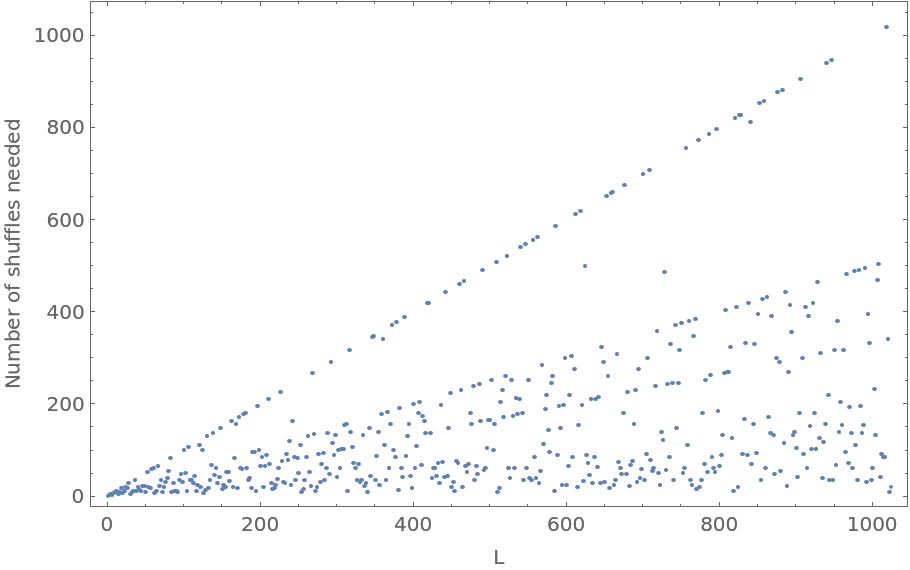 |
Wolfram Language 11.3 (March 2018) or above
This work is licensed under a Creative Commons Attribution 4.0 International License